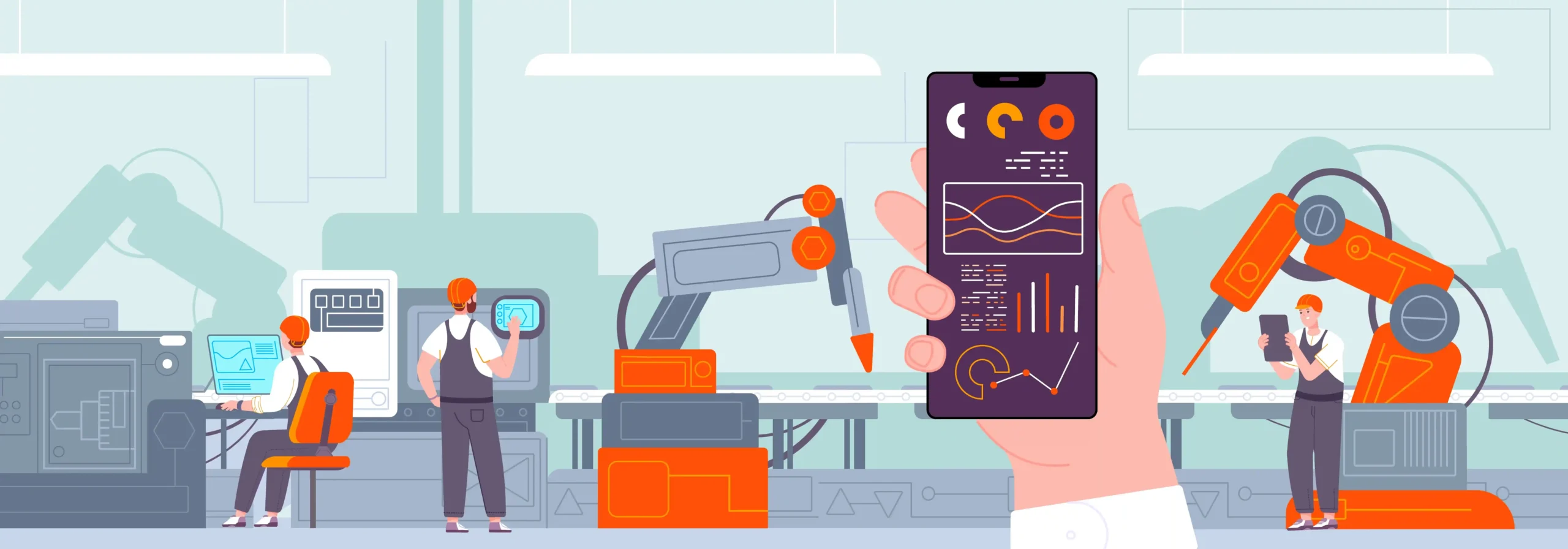Machine Learning Solutions for Manufacturing Challenges
Author: Inza Khan
02 September, 2024
The integration of machine learning will likely become a necessity, not just an advantage, for companies aiming to remain competitive in the global marketplace as we advance further into the era of smart manufacturing. The future of manufacturing will undoubtedly be shaped by the continued integration of machine learning, promising smarter factories, more resilient supply chains, and more sustainable production processes.
This blog explores the transformative impact of machine learning in manufacturing through real-world industrial use cases.

Industry 4.0: Machine Learning in Manufacturing
Machine learning, a subset of artificial intelligence, empowers computer systems to learn and improve from experience without being explicitly programmed. In the context of manufacturing, ML algorithms analyze vast amounts of data from sensors, production lines, and supply chains to identify patterns, make predictions, and optimize operations.
The integration of ML in manufacturing marks a significant shift from traditional rule-based systems to more adaptive and intelligent processes. This transformation enables manufacturers to achieve unprecedented levels of efficiency, quality, and flexibility. By leveraging machine learning, companies can address longstanding challenges in areas such as predictive maintenance, quality control, and supply chain management.
1. Predictive Maintenance
The Challenge
Equipment failure costs manufacturers billions of dollars annually due to unplanned downtime. Traditional maintenance schedules often lead to either premature part replacements or unexpected breakdowns, proving inefficient and costly.
The ML Solution
Predictive maintenance systems analyze real-time sensor data from equipment using machine learning algorithms. These systems identify patterns that precede failures, allowing accurate predictions of when maintenance is truly needed.
2. Robot Vision and Control
The Challenge
Traditional industrial robots lack flexibility and require extensive programming for each new task. They struggle with variability in part positioning and environmental conditions.
The ML Solution
Machine learning, particularly deep learning enables robots to “see” and adapt to their environment. ML-powered robots can recognize objects, adjust their movements, and even learn new tasks through demonstration.
3. Quality Control and Defect Detection
The Challenge
Traditional quality control methods rely on manual inspection or simple image processing techniques. These approaches often prove time-consuming, inconsistent, and prone to human error.
The ML Solution
Computer vision and deep learning models detect defects automatically with higher accuracy and speed than human inspectors. These ML systems process vast amounts of visual data in real-time, identifying even subtle defects that might escape the human eye.
4. Supply Chain Optimization
The Challenge
Manufacturing supply chains form complex networks vulnerable to disruptions. Traditional forecasting methods struggle with the multitude of variables involved in managing these intricate systems.
The ML Solution
Machine learning models optimize inventory levels, predict demand, and identify potential supply chain disruptions. These models analyze vast amounts of data from various sources, considering factors such as historical data, market trends, weather patterns, and even social media sentiment to make accurate predictions.
5. Energy Consumption Optimization
The Challenge
Energy-intensive manufacturing processes lead to high costs and significant environmental impact. Traditional methods struggle to optimize energy use across complex operations, as it involves balancing numerous variables and constraints.
The ML Solution
Machine learning systems analyze patterns in energy consumption and correlate them with production data. These systems identify opportunities for optimization and make real-time adjustments to energy usage based on current conditions and production demands.
6. Process Optimization
The Challenge
Manufacturing processes involve hundreds of variables that affect product quality and yield. Manual optimization or traditional statistical methods often prove time-consuming and result in suboptimal outcomes.
The ML Solution
Machine learning algorithms analyze historical process data to identify optimal parameter settings. These systems adapt in real-time to changing conditions, continuously learning and improving to achieve ongoing efficiency gains.
7. Product Design Optimization
The Challenge
Traditional product design processes are often time-consuming and rely heavily on designer intuition and experience. Testing multiple design iterations can be expensive and slow.
The ML Solution
ML algorithms can generate and evaluate thousands of design options based on specified parameters. These systems learn from each iteration, optimizing designs for performance, cost, and manufacturability.
Conclusion
As ML technologies advance and new use cases emerge, the potential for their impact on manufacturing grows exponentially. Companies that adopt these innovations early will gain a competitive edge, paving the way for smarter factories, more resilient supply chains, and sustainable production processes.
Xorbix Technologies is at the forefront of this evolution, providing cutting-edge machine learning solutions tailored to the unique needs of the manufacturing industry. Our expertise can help you harness the power of ML to overcome challenges and seize new opportunities. By partnering with us, you can stay ahead of the curve, driving growth and innovation in a rapidly evolving global market.
Read more on related topics:




